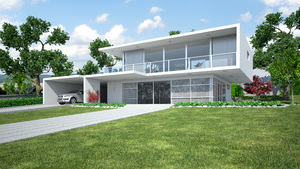More from Bella Virtual Staging USA
More in Politics
Related Blogs
Archives
Social Share
Enhancing Architecture: Exploring Advanced 3D Rendering Services
Body
The advent of architectural 3d rendering services has revolutionized the way architects, designers, and developers showcase their projects, enabling them to create immersive and realistic visualizations that transcend traditional rendering methods. This blog delves into the transformative impact of advanced 3D rendering services in enhancing architecture, from elevating design aesthetics to streamlining project communication and decision-making processes.
The Evolution of Architectural Visualization
Architectural visualization has evolved significantly over the years, with advanced 3D rendering services pushing the boundaries of creativity and realism in design representation. Gone are the days of flat blueprints and static drawings – architects now have the power to create dynamic, photorealistic renderings that capture the essence and vision of their projects with unprecedented detail and accuracy. The evolution of architectural visualization has ushered in a new era of design exploration, allowing architects to experiment with materials, lighting, textures, and spatial configurations in a virtual environment that mirrors reality.
Immersive Design Experience with Virtual Reality
One of the key advancements in 3D rendering services is the integration of virtual reality (VR) technology, which offers architects and clients an immersive design experience like never before. By donning VR headsets, users can step into a virtual representation of architectural designs, explore spaces from different angles, and interact with elements in real-time. This immersive design experience not only enhances project understanding and engagement but also enables stakeholders to provide valuable feedback and make informed decisions early in the design process. VR-enabled 3D rendering services bring designs to life in a way that fosters collaboration, creativity, and innovation in architecture.
Real-time Visualization and Iteration
Real-time visualization capabilities have become a game-changer for architects, allowing them to see their designs come to life instantly and make design decisions on the fly. With advanced 3D rendering services, architects can manipulate design elements, adjust lighting conditions, and experiment with different materials in real-time, giving them a comprehensive view of the design implications before finalizing their decisions. This real-time visualization and iteration process streamline design workflow, accelerate project timelines, and minimize errors, ultimately leading to more efficient and effective project outcomes.

Sustainability Integration and Analysis
Sustainability has become a core consideration in architectural design, and advanced 3D rendering services enable architects to integrate and analyze sustainable design strategies with precision and accuracy. From energy-efficient building materials to green technologies and renewable energy systems, architects can simulate and evaluate the environmental impact of their design decisions within the virtual realm. By leveraging 3D rendering services for sustainability analysis, architects can create buildings that are not only aesthetically pleasing but also environmentally conscious, fulfilling the increasing demand for sustainable architecture in today’s world.
Enhanced Client Communication and Engagement
Effective client communication is essential in the architectural design process, and advanced 3D rendering services provide architects with the tools to engage clients in a meaningful and compelling manner. By presenting photorealistic renderings, immersive walkthroughs, and interactive visualizations, architects can convey design concepts, spatial relationships, and material selections in a way that resonates with clients and stakeholders. This enhanced client communication fosters alignment of expectations, facilitates decision-making, and cultivates trust and confidence in the architectural vision, ultimately leading to successful project collaborations and client satisfaction.
Dynamic Presentation Capabilities
Advanced 3D rendering services offer architects dynamic presentation capabilities that go beyond static images and traditional drawings. From cinematic animations and fly-through videos to interactive 3D models and augmented reality experiences, architects can present their designs in a dynamic and engaging format that captivates audiences and showcases the full potential of their projects. These dynamic presentation capabilities not only differentiate architects in a competitive marketplace but also enable them to connect with clients, investors, and the public on an emotional level, fostering a deeper appreciation for the artistry and innovation behind architectural design.
Conclusion
Advanced 3D rendering services have redefined the architectural visualization landscape, empowering architects to elevate their designs, enhance client engagement, and streamline project workflows with unprecedented realism and precision. By embracing the capabilities of 3D rendering technology, architects can unleash their creativity, communicate their vision effectively, and push the boundaries of architectural innovation in ways that were once unimaginable.














Comments